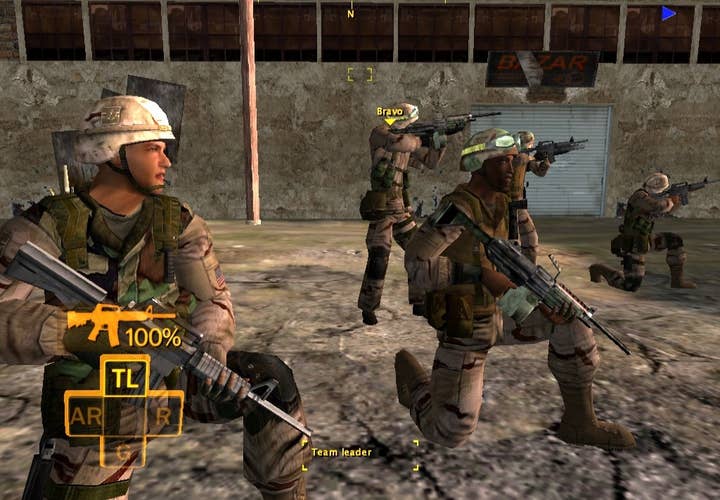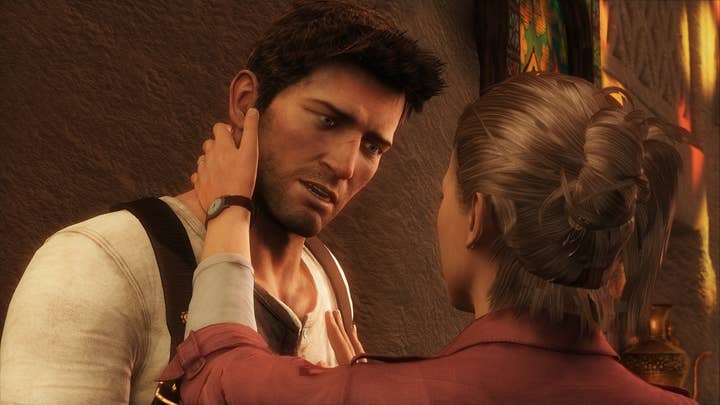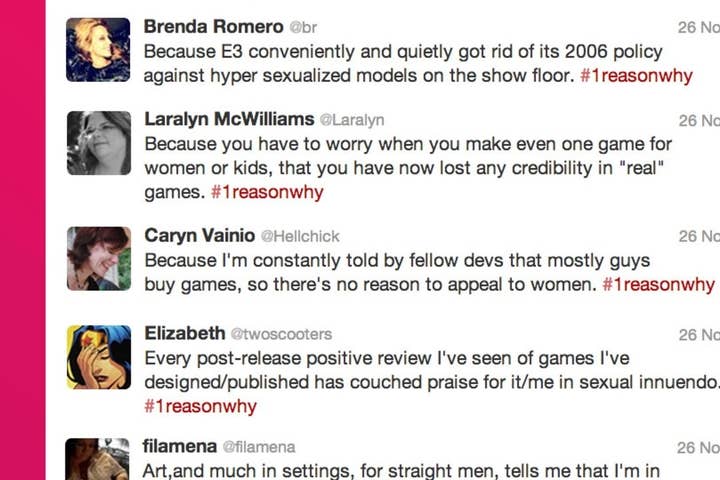Laralyn McWilliams: "It was time to be willing to stand up"
It took a hashtag and a Facebook scandal to pull Laralyn McWilliams into the debate on gender
In the second part of this interview with Laralyn McWilliams - the first part can be found here - the conversation turned to what has become a common topic for coverage of women in the games press: gender balance and gender equality, issues that are now part of the daily discussion in an industry that knows it must forge ahead, but often does so with a lack of grace, and in every direction at once.
In a 20-year career that started with her own studio, The Gloating Goat Company, in 1994, and comprised roles at High Voltage Software, Pandemic, Edge of Reality and Sony Online Entertainment, McWilliams carved out success in what are increasingly regarded as 'the bad old days' for women in the games industry. It wasn't until #1reasonwhy swept social media late in 2012 that she started talking about her experiences during that time, and then, thanks to the actions of one games journalist, the conversation escalated to an entirely new level.
In January this year, McWilliams posted a Facebook conversation between one of her close friends from the industry and a member of the games press. It showed the journalist - later identified as IndieStatik's Josh Mattingly, though not by McWilliams - making a series of crude and unsolicited sexual comments that ultimately caused an outcry, forcing him to resign from his job.
In the following conversation, McWilliams explains how her attitudes have changed with the passing years, the distance the industry has travelled, and just how far it still has to go.
"If we need games for 10-year olds do we need to hire 10-year olds to make games?' If I can't make a game for someone else I'm a shitty designer"
Well, as you may know from my blog, I didn't talk about it pretty much ever until recently. Only once have I even been on a panel about being a woman in game development.
Because for years... I started back in the days when I might be the only woman at a company, or one of the few at a company of 60 or 80 people.
Yeah. Coming out of that environment, at that time I was very disappointed to go to GDC as a speaker and see that all the other female speakers were talking about being women in game development, and not about what they actually did. And I was saying, 'I don't want to talk about that. I want to talk about my area of expertise. It doesn't matter that I'm a woman.'
I would get so frustrated when people would say things like, 'If we want more games for women we need more women in game development.' I thought, 'What the hell? If we need games for 10-year olds do we need to hire 10-year olds to make games?' If I can't make a game for someone else I'm a shitty designer. Before Full Spectrum Warrior the most military game I'd ever played was probably Castle Wolfenstein.

Yes, and the game I'm working on now [with The Workshop Entertainment] is probably the most male-oriented game I've ever worked on.
#1reasonwhy was probably the first time I ever spoke out about some of the bullshit. To be honest, to some extent I have the lack of social skills to just call somebody on it when they do something. It's not like being ballsy; it's just that the social part of my brain skips out and my programmer brain kicks in.
I guess the best example was I was put into the role of producer at a company where I hadn't been a producer before. I went to my first producer meeting, and somebody who had worked with me as a designer at that company for a couple of years already came into that meeting and said - not kidding - "I hope this goes better than the last time there was a woman in the producer meeting."
"If something bad is happening to me, robbing me of the ability to talk about it isn't even letting me own the situation. It's mine"
And my programmer brain kicked in and I said, "What does that mean?" He said they like to tell off-colour jokes, and I said, 'What are you talking about? I have, like, the dirtiest mind, and you know that. You know me. We've worked together for two years!' It wasn't until I was out of that situation that I realised how incredibly crappy that would be for somebody who was new. I'd been at the company for a long time so I was confident, and it didn't even occur to me to be at all scared of that - 'What a dick,' was my thought [laughs]. It was only afterwards.
#1reasonwhy was the first time I really talked about anything like that, and some of it was so surprising to me. I tweeted about meetings with publishers taking place in strip clubs, and there were all these people responding in shock. I was like, 'You must be new.' This is five years ago that this was still happening. This is not the old days at all.
Yeah, exactly. So the hashtag got me talking about it a little, but, honestly, it wasn't until my friend - and I'm sure you know the incident I'm talking about - that was the first time my name was dragged into it. Well, I shouldn't say 'dragged in' - I did it.
And I have another female friend going through that as well, and another female friend working in [another entertainment] industry who recently spoke out about - without naming any names - some of the incredibly shitty things that have happened to her over her career. One thing on the scale of what Mattingly did, and another thing where she was groped at a conference. But one of her former employers basically flipped out, even though she didn't name any names and the timing of it made it very clear that she wasn't at that company [at that time].
I won't say they were threatening her, but they were definitely very hostile toward her speaking out about what had happened. I just had enough at that point. Even though it wasn't happening to me, it was happening enough with friends of mine that felt it was time to be willing to stand up.
"I tweeted about meetings with publishers taking place in strip clubs, and there were all these people responding in shock. I was like, 'You must be new'"
I think it's unfair to expect people who have experienced something to be pressured into not talking about it. It was kinda the same for me with my cancer, because a lot of people wouldn't have talked about it publicly and I definitely thought about that. But I decided to talk about it, and when I got a little bit of pushback from people; from a professional perspective, maybe it would make potential clients of the company I was working for nervous. I remember very clearly how that felt.
If something bad is happening to me, robbing me of the ability to talk about it isn't even letting me own the situation. It's mine, and I need to feel like I have some control over at least talking about it. I think that's why I was willing to talk about what happened to my friend.
What's disheartening to me is that it seemed like people immediately divided into camps. There's the, 'I'm gonna light that dude on fire' camp, but he doesn't necessarily deserve to be lit on fire. That's not the intent. Let's just have a discussion. Then there's the second camp of, 'Let's all flood this guy with hate tweets and death threats.' And then there's the third camp of the people who seem to feel so much personal guilt for whatever reason that they start to attack little bits of it.
That third camp is the most disheartening. I expected the other two groups, but I didn't expect, 'it was her fault because she didn't stop him'. I hadn't really encountered that before, and then I started to see how often it really happens.
And it's all fuzzy lines. There's always ambiguity, like it happened at a party, or maybe they had dated in the past. Honestly, one of the reasons that I didn't talk a lot about these issues before is because sometimes I've found myself on the other side of the conflict.
It's died down a little bit now, but for a period of four or five years most of the talk was about why women weren't getting hired in certain roles. I'm in design, which has one of the lowest populations of females. And to me that was very frustrating, because during that period of time where there were so many complaints about women not getting hired, [but] it was often for games that they didn't play. And I was like, 'Sorry' [shrugs her shoulders].
"I vote with my mouth and with my dollars, and if I think something is shitty to women I'll tweet about that and I won't buy it - but it has a right to exist"
Personally, I have no problem working on a game that's made for men. That's the audience, right? I also don't have a problem with games that don't have a female playable character, if it's a game intended for men. I don't have a problem with a game that has a sexy female lead if it's intended for men. There's nothing wrong with making something for a particular audience and marketing it to them.
It has a right to exist as a product. I vote with my mouth and with my dollars, and if I think something is shitty to women I'll tweet about that and I won't buy it - but it has a right to exist. In the same way, I will not go out of my way to hire a woman for a position if she's less qualified than a man, unless she has something unique to bring to the table.
And she probably does. That's the thing.
I'm old enough to have watched how Dungeons & Dragons changed, because it used to be a bunch of dudes hanging out in the basement. No women. And all of the adventures were, 'Roll the dice, kill some shit, grab the loot, and get out.' But as they started to get older and brought their girlfriends in, these stories started to evolve. It evolved into what it is now, and I think women being in that audience played a part.
Full Spectrum Warrior had a deeper story because I was a part of it. It was very much a team effort, but there's one part that I felt the most ownership over: it was the system that drove the cut-scenes and the way the soldiers talked to each other. There was actually a pretty complex AI system behind that dialogue, and I had to rally for that system, because - and I've seen this on game after game - things that let the characters express emotion are lower priority than having six additional levels. I think that's something that, a lot of the time, women can bring to the table that men don't.
Yeah, exactly.

They're getting better in a lot of ways. I definitely see more women now. But I think there's one way that it's still kinda the same: games that aren't for men are still in the ghetto. They get low budgets. They get the B or C or even D teams at the larger companies. Nobody's going to put the God of War team on a game like that. They always get the short end of the stick.
And then there's one way in which it's worse. Whether it's just because social media was less prevalent, or whether it's because the internet has just condensed assholes....
"Games that aren't for men are still in the ghetto. They get low budgets. They get the B or C or even D teams at the larger companies"
I've been exposed to a lot of petty bullshit in my years in this industry, but never actual hate. In the past, it was more like casual exclusion, or just surprise that there was a woman - like, 'What?!' - but not hate. Now, sometimes you get hate just for being a woman, and that, in some ways, is worse. But I think it's people feeling threatened.
Yeah. From my personal perspective, the shame of the situation we're in today is that, if we had two equally qualified candidates for a design job on the game I'm working on - which, as I've said, is a very male-oriented game - if they were completely equally qualified I might lean toward the woman, just to balance the workplace a little. But I might lean toward the man. It depends on personality and other stuff, too. I'm even.
But if we were filling a community manager role, for example, there has to be this other level of debate: If you're making a game for a male audience, can you have a female community manager? Will she be as effective in her role as a man would be, because of the audience? Now, I feel very lucky to work at a company where the owners would say "That's bullshit!" and hire the woman anyway. If she's the right one for the job, she's the right one for the job.
What sucks is that we have to have that conversation. I've had the conversation about me, too. We have to consider whether I'm in any way going to be a public voice for this game, and my company's answer is, 'Of course you are, if you want to be.' But it's still crap that you have to have that conversation, and it's crap that gender has to play a role.
But then it's a business, and, like with free-to-play, sometimes as a business you have to make decisions that aren't the ones you'd like.
Because game companies are owned by men, and games are designed and built by men.
Yeah, for now.

